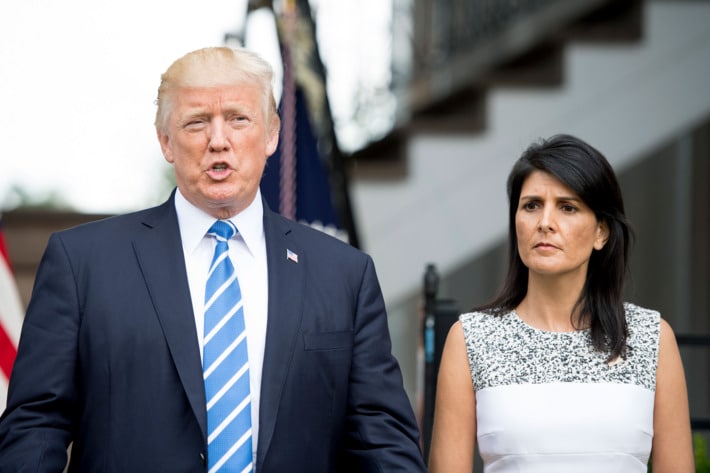US abruptly halt new sanctions over Russia’s involvement in Syria
Developments on Day 452 of the Trump Administration:
White House Says UN Ambassador Haley is Confused
A Donald Trump tantrum marks the sudden unravelling of US policy on Russia, with the abrupt cancellation of new sanctions and the White House turning against UN Ambassador Nikki Haley as “confused”.
Administration officials told journalists on Saturday that the announcement of new sanctions was expected on Monday, over Russia’s support of Syria’s Assad regime and following the regime’s April 7 chemical attacks near Damascus. Three said Trump had signed off on the restrictions.
Appearing on two high-profile political talk shows on Sunday, Haley announced the imminent measures.
But, according to “an official informed about the moment”, Trump blew up when he saw Haley’s interviews, yelling at the TV and insisting that he had not agreed.
“Several officials” said Haley, despite being a prominent face for US foreign policy after Trump’s firing of Secretary of State Rex Tillerson in early March, had not been informed of the change in approach.
A Russian Foreign Ministry official said the Trump Administration assured them soon after Ms Haley’s comments that the sanctions were not forthcoming.
The Monday announcement never took place, and on Tuesday Larry Kudlow, Trump’s top economic advisor, pinned blame on Haley:
She got ahead of the curve. She’s done a great job. She’s a very effective ambassador, but there might have been some momentary confusion about [the sanctions].
Rather than accepting the slapdown, Haley said, “With all due respect, I do not get confused.”
Kudlow then apologized in a call to The New York Times:
She was certainly not confused. I was wrong to say that — totally wrong.
As it turns out, she was basically following what she thought was policy. The policy was changed and she wasn’t told about it, so she was in a box.
The episode has raised further questions about Trump’s handling of personnel and his reluctance to challenge Russia and President Vladimir Putin, a man for whom he has expressed admiration.
Trump has used Twitter to insult and undermine his officials, such as Tillerson and Attorney General Jeff Sessions. Meanwhile, he has been reluctant to impose sanctions on Moscow, opposing and then balking at implementation of Congressional measures passed last July — including over the Russian involvement in the 2016 election which Trump won — and maintaining silence over episodes such as Russia’s possible involvement in a nerve agent attack in southern England in March.
However, Trump suddenly shifted position on April 8, as he saw TV images of the victims of the chemical attacks by the Assad regime, which is propped by Russia’s military, political, and economic support. He declared on Twitter that Russia, Iran, and the regime must “pay a big price over the attacks”.
Part of that price was in US-UK-French missile attacks on three Assad regime military sites last Saturday. Additional sanctions on Russia were supposed to be part of a wider set of measures.
Senators “Unnerved” After Briefing on Administration’s Syria Policy
Leading Senators have expressed concern about the Administration’s approach to Syria after a classified briefing.
“I am very unnerved by what I’m hearing and seeing,” said Sen. Lindsey Graham, a Republican, who said the briefing on the strikes made him more worried. He cautioned that the administration is “going down a dangerous path”, without offering details.
Other Senators appeared to be worried that Trump will pursue his desire for a withdrawal of US forces, despite opposition from the Pentagon. Democrat Chris Coons told reporters:
The only thing worse than a bad plan on Syria is no plan on Syria, and the President and his administration have failed to deliver a coherent plan on the path forward.
I think it’s important for us to remain engaged in Syria and to pursue a diplomatic resolution. If we completely withdraw, our leverage in any diplomatic resolution or reconstruction or any hope for a post-Assad Syria goes away.
Bob Corker, the chair of the Foreign Relation Committee, expressed resignation, “Syria is Russia and Iran’s now. They will be determining the future. We may be at the table, but when you’re just talking and have nothing to do with shaping what’s happening on the ground, you’re just talking.”
Asked if he felt the Administration should take more military steps, Corker said:
They’re not going to. I understand it’s not going to happen. It’s just not going to happen. To do so would take a significant effort by our military and I just don’t think that’s where the American people are right now.
Trump has said for weeks that he wants US personnel to “get out”, asking Saudi Arabia for $4 billion to cover the withdrawal and take over stabilization efforts in northern Syria. The response to the Assad regime’s chemical attacks on April 7 near Damascus raised the prospect of a reversal, but the White House said earlier this week that Trump is still committed to withdrawal — albeit with the escape clause that it will be after the Islamic State is defeated.
Lawmakers of the House of Representatives, after their own briefing, said there was little discussion about a broader strategy for addressing the Assad regime, or about additional military or diplomatic efforts.
Democrat Adam Schiff said the briefing focused on last Saturday’s US-UK-French missile strikes:
We certainly did get additional insights into the targeting of the facilities, what we knew about it, what we know about the [Assad regime’s chemical] attack itself, what these facilities were used for, what actions if any took place between the time the President announced we were going to strike and when we did strike, so we got an additional granularity.

